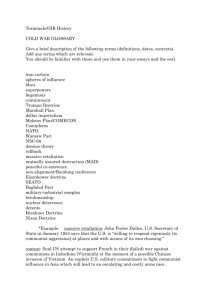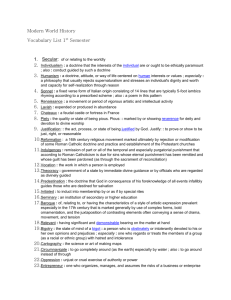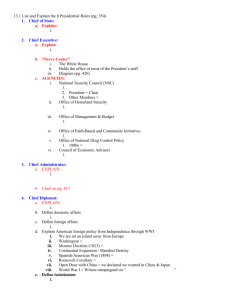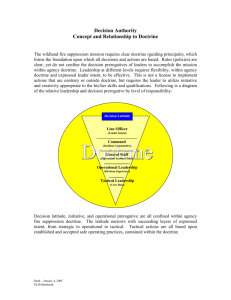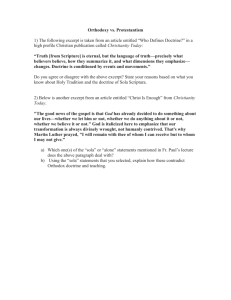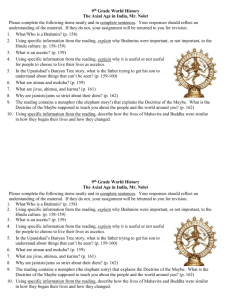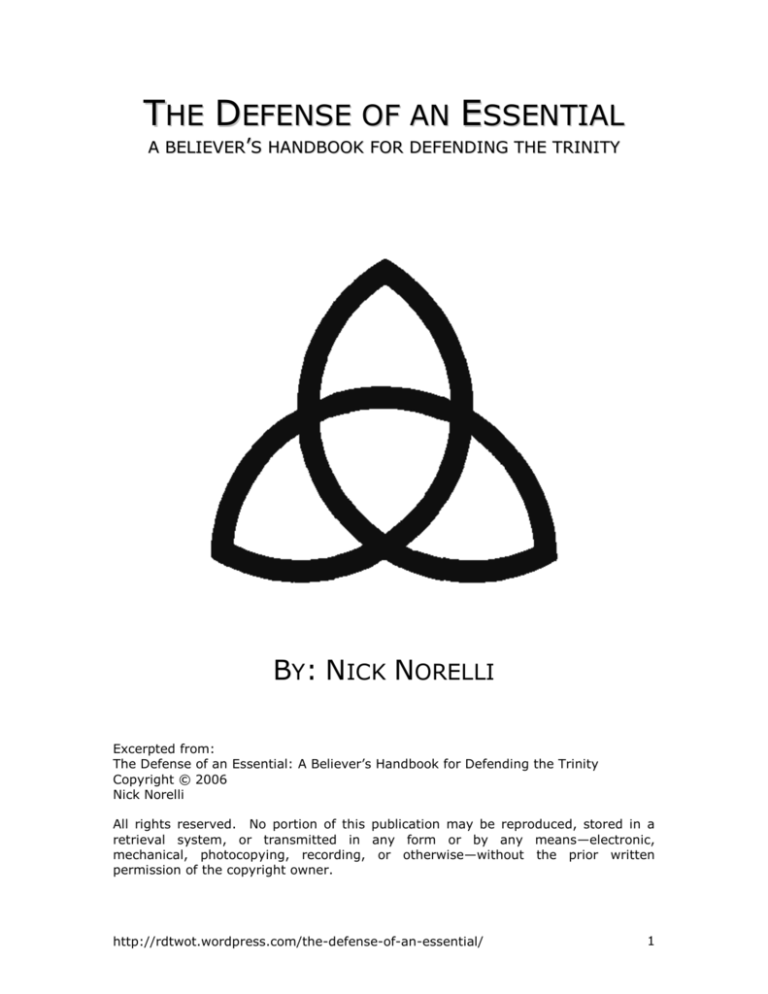
THE DEFENSE OF AN ESSENTIAL
A BELIEVER’S HANDBOOK FOR DEFENDING THE TRINITY
BY: NICK NORELLI
Excerpted from:
The Defense of an Essential: A Believer’s Handbook for Defending the Trinity
Copyright © 2006
Nick Norelli
All rights reserved. No portion of this publication may be reproduced, stored in a
retrieval system, or transmitted in any form or by any means—electronic,
mechanical, photocopying, recording, or otherwise—without the prior written
permission of the copyright owner.
http://rdtwot.wordpress.com/the-defense-of-an-essential/
1
Doctrinal Distortions
By: Nick Norelli
Sound Doctrine
Doctrine is one of the most important parts of our Christian lives. Without
sound doctrine we would have no standard by which to live. We would have no
concrete method in which we were able to judge whether or not a thing was true.
Doctrine is to scripture as inch markers are to rulers. In other words, the Word of
God is the set standard, and the doctrines contained within the Word of God are
what allow us to measure the accuracy or truthfulness of a thing.
The Proverbs speak of God giving us “good doctrine” (Pro. 4:2) while Paul
speaking to Timothy reveals that the doctrine of God is on par with his name
because it can be blasphemed (1Tim. 6:1). We are told to “give attendance to
reading, to exhortation, and to doctrine” (1Tim. 4:13). It has also been revealed
that “all scripture is given by inspiration of God, and is profitable for doctrine” (2Tim.
3:16). We are told to “reprove, rebuke, and exhort with all longsuffering and
doctrine,” being warned that the “time will come when they will not endure sound
doctrine” (2Tim. 4:2-3). Nevertheless we are still to “speak the things which
become sound doctrine” (Tit. 2:1).
A Little Leaven
On the flip side of this coin we see in scripture that there are “doctrines of
devils” (1Tim. 4:2). Jesus warned his disciples to “beware of the leaven [doctrine] of
the Pharisees and of the Sadducees” (Mat. 16:6, 12). Paul tells us to “be no more
children tossed to and fro and carried about by every wind of doctrine” (Eph. 4:14)
while Peter tells us that those who are “unlearned and unstable wrest [twist] the
scriptures to their own destruction” (2Pet. 3:16). Having laid this foundation we can
now look and see that Jesus revealed one of the most important truths of scripture in
John 8:44.
Jesus plainly told us that the devil is a liar and the father of lies; he abode not
in the truth because there was no truth in him. If we examine the various lies of
Satan in scripture there is a theme that occurs quite often. He distorts the truth in
order to weaken the strength of its message, and many times the lie is believed. We
see this clearly in the Garden of Eden when the serpent tempted Eve. The serpent
approached Eve and said to her that God had said not to eat of every tree of the
garden (Gen. 3:1), when the true command was that they may eat freely of every
tree in the garden with the exception of the tree of the knowledge of good and evil
(Gen. 2:16-17).
A Lot of Illogic
It is needful to point out that there are a variety of logical fallacies which are
used to argue against the Trinity. These include:
Straw Man Arguments
http://rdtwot.wordpress.com/the-defense-of-an-essential/
2
This is when a person’s argument is deliberately misrepresented so as to
weaken its strength and subsequently make it easy to knock down. The problem
being that the weaker argument is not the actual argument of the person being
misrepresented.
Faulty Analogies
There is no such thing as something that is perfectly analogous. In other
words, all analogies fail at one point or another, but a faulty analogy is blatant. This
fallacy occurs when the things being compared are relatively dissimilar.
Circular Reasoning/Begging the Question
Circular Reasoning or Begging the Question occurs when a premise is simply
restated in the conclusion without actually having been proven true.
Slippery Slopes
Slippery Slopes come in two forms, either causal or semantic. A causal
slippery slope is when a series of small propositions (B-Y) are set forth in order to
assert that A will result in Z, yet the strength of these steps is not firmly established.
A semantic slippery slope relies on the vagueness between opposite terms in a
continuum. This is not common to anti-Trinitarians while the first argument is.
Equivocation
Equivocation is a fallacy of ambiguity. Most if not all words have various
meanings and equivocation occurs when one word is used with two or more of its
meanings to make an argument appear valid, when in fact it is not.
Appeals to ridicule
An Appeal to Ridicule if a fallacy of mocking; rather than address the actual
argument, an opponent will mock it and write it off due to the silliness or
ridiculousness of the argument. There are times when it is proper to reject an
argument based on the nonsensicalness of it, but it must first be proven nonsensical.
This list is but a sampling, there are various other logical fallacies used to
argue against the doctrine of the Trinity. In the next section we will observe the
various ways that people and groups who deny the truth of the Trinity misrepresent
the teaching in order to prove their position correct. In addition to correcting the
various errors that are espoused when these groups change the Trinity teaching, I
will also be giving a little background information on these groups as well as their
beliefs. There is one thing that every known non-Christian group has in common,
and that is a denial of essential Christian doctrine, especially the Trinity.
http://rdtwot.wordpress.com/the-defense-of-an-essential/
3


